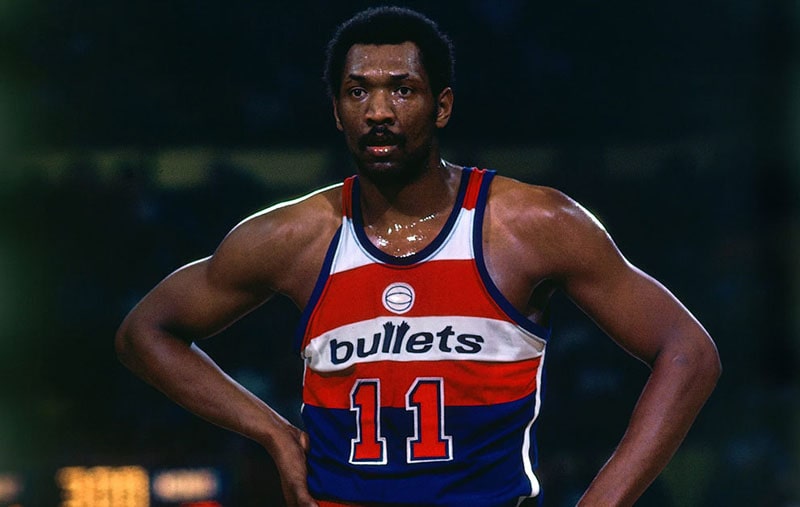
Basketball – Inducted into the Hall of Fame in 2003
In 1968 the expansion San Diego Rockets had the first overall pick in the NBA Draft. With their pick the Rockets selected a 6’9 ½” center that went by the nickname “The Big E.”
Elvin Hayes had stormed onto the national basketball scene while at the University of Houston. With his notorious turnaround jump shot, Hayes became a three-time All-America, and led the Cougars to an 81-12 record and two Final Four appearances. He wowed basketball fans across the country in the first-ever nationally televised college game in history, when he held UCLA’s Lew Alcindor to 15 points, while scoring 39 himself, with 15 rebounds. Houston’s victory, in what has since been called “The Game of the Century,” concluded the Bruin’s 47-game win streak. Hayes ended his collegiate career by being selected as the College Player of the Year by The Sporting News.
Hayes moved seamlessly from the college ranks to the pros. He led the NBA in scoring as a rookie in 1969, averaging 28.4 points-per game. He ranked fourth in the league with 17.1 rebounds, and was named to the NBA All-Rookie Team. He also set an NBA rookie record for minutes played in a season (3,695), averaging 45.1. In his first season as a pro, Hayes helped lead the Rockets to a 37-45 record in 1968-69 and a spot in the playoffs; it was a 22-victory improvement over the previous year. Despite his success, Hayes missed out on NBA Rookie of the Year Award to Wes Unseld of the Baltimore Bullets, who also earned league MVP honors as well.
Elvin Hayes played in San Diego for three seasons before the Rockets moved to Houston. In that short period he scored 2,311 points and totaled 4,154 rebounds. But more importantly, he became one of the dominant players in the game and San Diego’s first professional basketball star.
The Rockets left San Diego following the 1970-1971 season, and Hayes went with them. He played one year in Houston before being traded to the Baltimore Bullets in June of 1972. He stayed with the Bullets through the 1980-1981 season. While with the Bullets (the team moved from Baltimore to Washington in 1973), Hayes teamed with fellow future Hall of Famer Wes Unseld to form a dominating frontcourt combination.
Things took a surprising turn for Hayes and the Bullets during the 1977-78 season. Washington posted a modest 44-38 record that year, but they caught fire in the playoffs, eliminating the Atlanta Hawks, the San Antonio Spurs, and the Philadelphia 76ers en route to the NBA Finals against another unsung team, the Seattle SuperSonics.
Seattle and Washington exchanged wins through the first six games, setting up a Game 7 showdown in Seattle. Washington won the final game 105-99, and the Bullets took home the NBA Championship. During the Bullets’ postseason run Hayes averaged 21.8 points.
At last, after 10 seasons in the NBA, Hayes had a championship ring and partial vindication for at least some of the criticism that had dogged him along the way. “Finally winning the championship completes the picture,” Hayes remarked, “because no one can ever again say that E’s not a champion.”
From Washington, Elvin Hayes was traded back to the Houston in 1981 and played three seasons with the Rockets before retiring in 1984.
Elvin Hayes played 16 years in the National Basketball Association and retired as one of the greatest players in the history of the game. He scored 27,313 points in 1,303 professional games. His 21 points-per-game average was third best in NBA history at the time of his retirement. He pulled down 16,279 career rebounds, a 12.5 average per game, again third best in history at the time of his retirement. He also had played more minutes than any other player in history, 49,006, an average of 37.6 per game.
Hayes made the All-NBA First Team in 1975, 1977 and 1979, and the second team in 1973, 1974 and 1976. He was a twelve-time NBA All-Star during the period 1969-1980, but he received the two ultimate compliments for a basketball player after his career had ended. He chosen as a member of the Induction Class of 1990 to the Naismith Memorial Basketball Hall of Fame, and in 1996 he was chosen as one of professional basketball’s top 50 players during the NBA’s 50th Anniversary celebration in 1996.
Now Elvin Hayes can add one more line to his long and distinguished basketball resume, his induction into the Brietbard Hall of Fame.
- First overall pick in the 1968 draft
- All-NBA First Team (1975,1977,1979)
- All-NBA Defensive Team (1974, 1975)
- Twelve-time NBA All-Star (1969-80)
- Scored 27,313 points (21.0 ppg) in 1,303 professional games, third best in history upon retirement
- Grabbed 16,279 rebounds (12.5 rpg) in 1,303 professional games, third best in history upon retirement
- Upon retirement, played more minutes (49,006, 37.6 mpg) than any player in history
- Upon retirement, ranked third all-time in games played (1,303) and blocked shots (1,743) NBA 50th Anniversary All-Time Team (1996)
- Led the league in scoring (1969) with 28.4 ppg, his best professional scoring season

 Beranda
Beranda
 Whatsapp
Whatsapp
 Daftar
Daftar
 Promosi
Promosi
 Telegram
Telegram